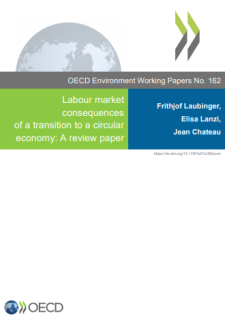
If current socio-economic trends continue, the demand for natural resources is projected to more than double by 2060, with potentially severe environmental consequences. Therefore, transitioning to a circular economy is vital to fulfill environmental targets and the transition process will distinguish the changes in labour markets which are to raise challenges in the social domain.
This report presents a review of existing literature on the labour market, employment, and skills implications of the transition to a more resource-efficient and circular economy. Overall, four mechanisms are likely to affect the labour market: changes in production modes, in demand patterns, in aggregate income and macroeconomic conditions, and in trade and competitiveness. Through these mechanisms, the circular economy transition can induce a variety of effects on labour markets, including job creations, job substitutions, job losses, and job redefinitions. The interplay of these drivers determines the net aggregate effect of circular economy policies on the labour market.
